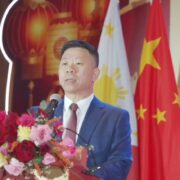No pleasantries: A telling message from the Chinese

At first blush, it sounded as though outgoing Chinese Ambassador Huang Xilian was just being pleasant when he addressed Vice President Sara Duterte during China’s 76th founding anniversary and his farewell reception, “At this moment of parting, I bid farewell to VP Sara Duterte. Madam Vice President, thank you for your support and dedication to China-Philippines friendship. Hope our bilateral relations will get back to a sound and healthy track soon,” he said.
But nothing is accidental in the geopolitical arena and in diplomacy. Every word is deliberate. And in the context of Philippines-China relations, especially our current rejection of the latter’s expansionist stance and its gray-zone tactics, the outgoing ambassador’s message is rife with meaning.
Huang’s words were not just polite farewell words of any ambassador about to leave his post. He looked upon and addressed the Vice President fondly and with effusive praise. Under the administration of the VP’s father, the Philippines adopted a policy of appeasement toward China. Between 2016 and 2022, Manila leaned away from its traditional partners toward accommodation of China, despite the maritime tensions it initiated. In fact, the former President Rodrigo Duterte declared that Philippine relations with China were at their best during his time.
The Chinese thus likely hoped that with the election of President Ferdinand Marcos, Jr., Sara Duterte’s running mate, their happy days would continue. Sara Duterte as Vice President provided some hope that even with the change in administration, the Philippines would still accommodate China’s bullying. They expected a foothold in Philippine politics that can secure its strategic interests beyond the Duterte presidency.
But Marcos Jr. had a different policy altogether, even declaring that the Philippines would not surrender even a square inch of territory to any foreign power.
Getting back to a “sound and healthy track” tells us that China sees the current relationship as unsound and unhealthy. The Marcos administration has visibly pushed back and resisted China’s attempts to assert its unfounded claims on our sovereignty, even going to the extent of spreading disinformation on the matter.
In pursuit of its own interests, China may be seeing this stance by the Philippines as offtrack, an aberration. It may be longing for the Dutertes as their preferred partners in Manila. For the Chinese, the healthy path means returning to the Duterte-era policy of preferential engagement and turning a blind eye to Chinese incursions into the West Philippine Sea.
The words are a thinly veiled criticism of Mr. Marcos’ firmer stance in defending Philippine sovereignty, reinvigorating defense ties with like-minded partners.
With the arrival of a new Chinese ambassador, there is little reason to expect a change in Beijing’s posture. Its pattern of aggression reflects a long-standing strategy that transcends personalities in the embassy. Diplomats may change, but China’s objectives remain the same: to expand its hegemonic control in the entire South China Sea.
But equally telling was what VP Sara Duterte said during the event. She described Philippines-China ties in language uncannily similar to Beijing’s script: “mutual respect, sovereign equality, and a shared commitment to peace,” even claiming that cooperation was “anchored in international law.”
Such statements are far removed from the lived reality of Filipinos in the West Philippine Sea, where China has ignored international rulings, harassed fishermen, and undermined Philippine sovereignty. Sara Duterte should not deny the depth of the Filipino people’s opposition to Beijing’s influence: in a September 2024 survey held by Pulse Asia, 72 percent of Filipinos said they would support an anti-China candidate, while only 17 percent favored a pro-China candidate. The decisive margin underscores that any political figure openly aligned with Beijing risks losing the confidence of a clear majority of voters. These results confirm that defending Philippine sovereignty in the West Philippine Sea is not just a foreign policy imperative but also an important issue in the country’s electoral politics.
With Filipinos overwhelmingly rejecting pro-China candidates, defending sovereignty in the West Philippine Sea has become a defining political issue.
And our leaders must listen.
China is pursuing its expansionist ambition, even if that means disregard for international law and baseless claims regarding its own and other countries’ sovereignty. But Philippine leaders—acting on China’s behest and adopting a policy of appeasement and accommodation when they should be the first ones to defend our country from persistent acts of aggression—are another story.
We must be extremely wary of them, see through their crafty messages, and refuse to let them represent us again.
—————-

















When dev’t serves power, not the public